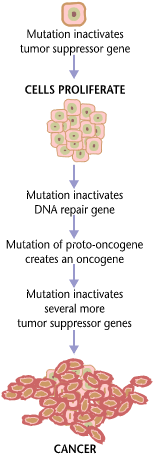The thing about cancer is that it's a biological process -- several, in fact, occurring simultaneously. Cancer is a series of genetic and epigenetic malfunctions. It isn't caused by any solitary force. And it certainly isn't caused by mysterious "toxins" with no names or identities. It isn't caused by your attitude either, or your karma (by the way, the western definition of karma is not even entirely accurate), or even when your room mate peed in the mini fridge in your dorm room the night he was really drunk.
 |
| The process looks like this. |
The first and most important line of defense is to do your research. In today's culture, fact-checking has become a long-forgotten practice. Claims are made, and whoever yells the loudest is always declared the most honest. That's not how science works, unfortunately. In the real world, experts propose hypotheses and test them until they can be fully evaluated and verified. And, as Neil deGrasse Tyson put it, "The good thing about science is that it's true whether or not you believe in it."
For whatever reason, the age of information has had the opposite effect of informing the public. It could be that with all of this information at hand, it makes it easier for people to believe that they know much more about a particular issue than they really do. It still takes years of schooling to become an expert in a given field, like oncology. The danger arises among those who falsely profess a knowledge of healthcare and push miracle cures on the public that only they have uncovered through collecting pee from public parks, or shooting coffee into your rectum. It's not easy to determine whether or not modern snake oil salesmen peddle their wares with the intention of making money from their faulty products, or if they genuinely think what they're doing will provide some benefit. I tend to believe the former in most cases. The current state of healthcare in America reminds me of my favorite quote by science fiction writer Isaac Asimov: "Anti-intellectualism has been a constant thread winding its way through our political and cultural life, nurtured by the false notion that democracy means that 'my ignorance is just as good as your knowledge.'"
All of these alternative therapies will bankrupt you, because they're obscenely expensive and your insurance won't pay for them, because they aren't medicine. Mainstream healthcare is also extremely expensive, to be fair, and the U.S. is by far the most expensive nation in which to get sick. But there is a mechanism in place to at least ensure that a patient can find treatment backed by real medical science. If you aren't sure how to find out whether or not a treatment is bogus, just look for the clinical research. Real treatments are published, peer-reviewed, and independently verified over a number of years in order to ensure their safety and effectiveness. Cancer is tricky, because we can't at this point cure it, and that scares many people into thinking that's because traditional treatments don't work, when really it's just the best we can do at this point. With the advent of new immunotherapy research, results and patient outcomes are looking even more promising these days, and we can expect a new wave of even more effective treatments very soon. Human innovation is a process. Yes, people are greedy, and things still cost money. But the most villainous and greedy among us are the opportunists who take advantage of the desperation of others.

No comments:
Post a Comment